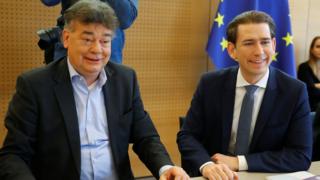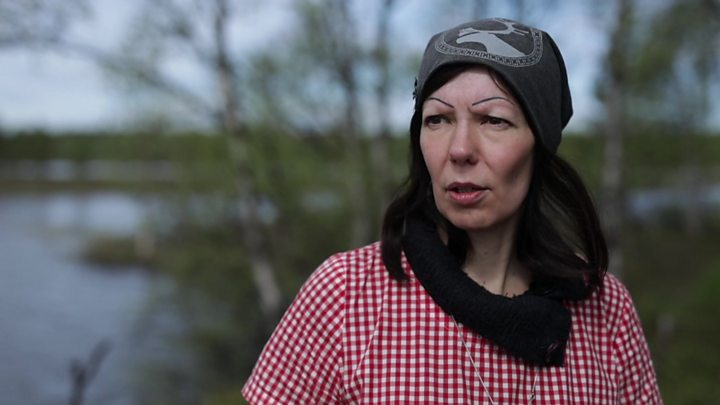 Image copyright Reuters
Image copyright Reuters A recent video by Austria’s Green Party celebrating their coming to power begins with a clip of their leader, Werner Kogler, speaking last summer before the election – invoking a cowboy movie-star hero.
“I’m doing a Clint Eastwood,” he says. “We ride into town and the rest surrender.”
The word “surrender” is tinged with some irony. For the first time, the left-wing Greens are part of a federal government in Austria, in a coalition with the conservative People’s Party led by Sebastian Kurz.
The Greens are the junior partner, after attracting 14% of the vote in elections last September, while the conservatives won 37%.
The party has joined the government at a time of growing concern over climate change. So does the new pact mean that environmental issues have now transcended traditional left and right divisions?
“We have some quite ambitious targets in our government programme,” Magnus Brunner, a state secretary for the People’s Party, told the BBC.
“For instance, (we want) 100% renewable energy power by 2030, which is very ambitious.”
When asked if the new coalition with the Greens was a sign that environmental issues were transcending old divisions between left and right, he said that they had taken the best of both worlds, green and conservative.
“Both worlds have their advantages, I think. And I think now it’s a very good government programme we have. We have to say the conservative world is a little bit green too.”
- Austria backs green agenda with new coalition deal
- New justice minister hit by hate speech in Austria
The government’s plans include higher taxes on short flights and cheaper train travel. The programme aims to make Austria climate neutral by 2040.
But it also includes hardline policies on immigration and a ban on girls under 14 from wearing headscarves in school that were harder for left-wing Greens to swallow.
Ulrike Lunacek, a state secretary for the Greens, says the negotiations were difficult, especially on issues like asylum and migration. But the result, she insists, is the greenest government Austria has ever had.
“Traditionally (the Greens) are left liberal. But in general, I’ve always tried to explain to my colleagues in the green parties who did not like the idea of going into government with a centre-right party, that in areas like environmental protection, you also talk about conserving things.”
“In that sense, the Greens, even if we are left-liberal, also have something of this positive sense of conservative ideas.”
BBC
We bridge the divide… conserving not just nature, but using resources in a sustainable way. And if that’s conservative, well, why not?”
Over coffee in a Vienna café, the political analyst Thomas Hofer told me the government program is heavily dominated by conservative policies.
He says the pact with the Greens benefits the conservative leader, Austria’s Chancellor Sebastian Kurz, softening his image after his last coalition with the far right.
- Far right quits Austrian government after sacking
- Mystery of the honey-trap video that shook Austria
“Sebastian Kurz can be really happy,” he said.
“He’s going to have a right wing government when it comes to migration, to tax reform, but with a totally different coalition partner that is on the left.”
Mr Kurz, he said, is embracing the message of climate change “on the surface.”
BBC
[Mr Kurz] is taking this into his message, but he won’t be the one punishing car drivers by raising the taxes on gasoline a lot, or punishing people for eating meat
“So for Kurz, it’s certainly a great situation because he can say, okay, we do want to fight climate change. But the Greens couldn’t pin down details in their ecological tax reforms, so there are no measures yet that are really hurting a lot of his constituencies.”
Could Greens follow suit in Germany?
The alliance is being closely watched in Germany where polls suggest a similar coalition could be possible after the next election.
But some German Greens have baulked at the concessions made by the Austrian Greens, particularly when it comes to immigration.
For some people sympathetic to the Green cause, the new coalition is complicated. At a Vienna market café, I met Levi Weber, a student of political science.
“At first I was optimistic but now that this coalition pact is out, I am very sceptical because Kurz has got a lot of things that are very right wing,” he told me.
Levi said he was worried that Sebastian Kurz might try to weaken the Greens to consolidate his own power.
“Kurz just hopes that the Greens don’t get as strong as they are in Germany and cost him votes.”
“I want Austria to be a leader in climate action in Europe,” he said. “Austria is in a position to do this and I hope it will happen.”
“I’m optimistic, but very sceptical too.”

Media playback is unsupported on your device
Click Here to Visit Orignal Source of Article https://www.bbc.co.uk/news/world-europe-51383838

